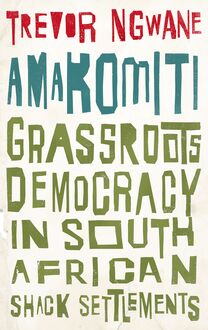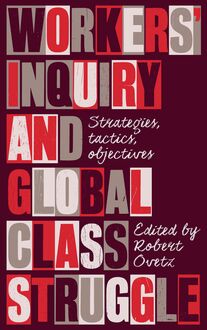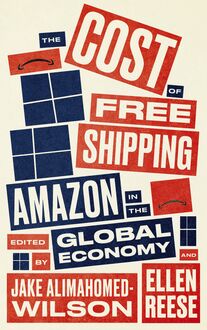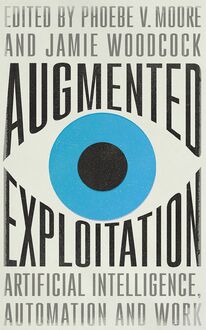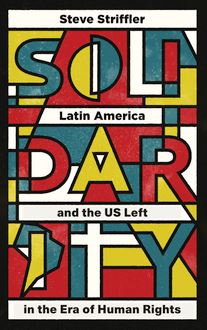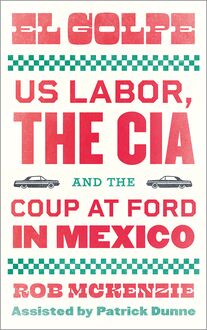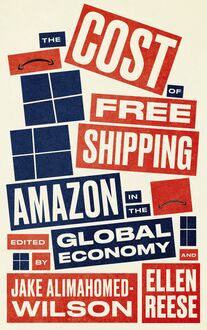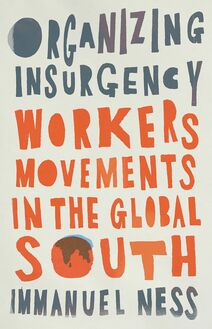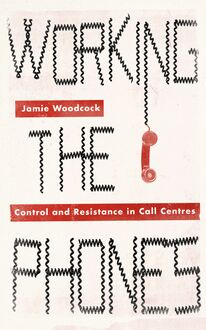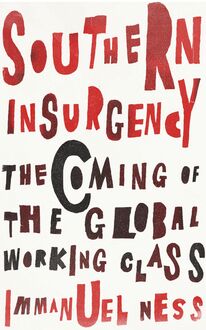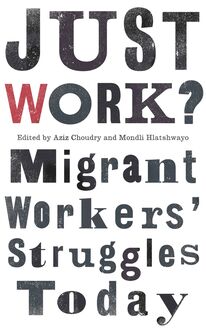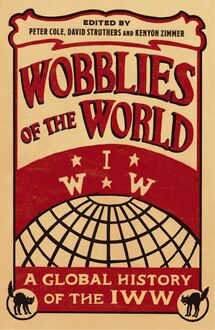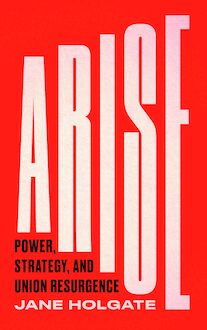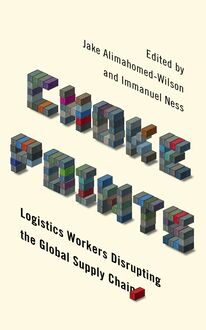El Golpe , livre ebook
171
pages
English
Ebooks
2022
Vous pourrez modifier la taille du texte de cet ouvrage
Obtenez un accès à la bibliothèque pour le consulter en ligne En savoir plus
Découvre YouScribe et accède à tout notre catalogue !
Découvre YouScribe et accède à tout notre catalogue !
171
pages
English
Ebooks
2022
Vous pourrez modifier la taille du texte de cet ouvrage
Obtenez un accès à la bibliothèque pour le consulter en ligne En savoir plus
'Early in my research, a friend with excellent knowledge of the United Auto Workers internal operations told me, "Don't give up. They are hiding something"…'
It’s 1990, and US labour is being outsourced to Mexico. Rumours of a violent confrontation at the Mexican Ford Assembly plant on January 8 reach the United Auto Workers (UAW) union in the US: nine employees had been shot by a group of drunken thugs and gangsters, in an act of political repression which changed the course of Mexican and US workers’ rights forever.
Rob McKenzie was working at the Ford Twin Cities Assembly plant in Minnesota when he heard of the attack. He didn’t believe the official story, and began a years-long investigation to uncover the truth. His findings took him further than he expected – all the way to the doors of the CIA.
Virtually unknown outside of Mexico, the full story of ‘El Golpe’, or ‘The Coup’, is a dark tale of political intrigue that still resonates today.
List of Photographs
Series Preface
Acknowledgments
List of Abbreviations
Prologue
PART I U.S. LABOR’S COLD WAR IN LATIN AMERICA
1. The Birth of AIFLD and the Coup in British Guiana
2. Labor’s Foreign Policy Contested and the Military Takeover in Brazil
3. AIFLD and the Battle of Chile
4. El Salvador, Nicaragua, and AIFLD’s Agenda for Central America
PART II EL GOLPE
5. Mexico in the 1980s
6. U.S. Auto Companies Move South
7. The Coup
8. The Strike
PART III TRACKING THE ASSASSINS
9. Detroit
10. St. Paul
11. Washington, DC
Conclusion: Putting Together the Pieces of the Puzzle
Appendix: On the Home “Front”
Photographs
Notes
Index
El Golpe
An impressive piece of sleuthing. McKenzie s dogged search for answers shines a spotlight on AIFLD with its CIA links.
-Anthony Carew, author of American Labour s Cold War Abroad: From Deep Freeze to D tente
An in-depth study of the rot existing within the foreign policy leadership of the AFL-CIO. Expunging this rot is essential to the revitalization of the US labor movement.
-Kim Scipes, Professor of Sociology,
Purdue University Northwest and author of Building Global Labor Solidarity
Wildcat: Workers Movements and Global Capitalism
Series Editors: Immanuel Ness (City University of New York) Peter Cole (Western Illinois University) Raquel Varela (Instituto de Hist ria Contempor nea [IHC] of Universidade Nova de Lisboa, Lisbon New University) Tim Pringle (SOAS, University of London)
Also available:
The Cost of Free Shipping: Amazon in the Global Economy Edited by Jake Alimahomed-Wilson and Ellen Reese
Choke Points: Logistics Workers Disrupting the Global Supply Chain Edited by Jake Alimahomed-Wilson and Immanuel Ness
Power Despite Precarity: Strategies for the Contingent Faculty Movement in Higher Education Joe Berry and Helena Worthen
Dying for an iPhone: Apple, Foxconn and the Lives of China s Workers Jenny Chan, Mark Selden and Pun Ngai
Just Work? Migrant Workers Struggles Today Edited by Aziz Choudry and Mondli Hlatshwayo
Wobblies of the World: A Global History of the IWW Edited by Peter Cole, David Struthers and Kenyon Zimmer
Arise: Power, Strategy and Union Resurgence Jane Holgate
Augmented Exploitation: Artificial Intelligence, Automation and Work Edited by Phoebe V. Moore and Jamie Woodcock
Organizing Insurgency: Workers Movements in the Global South Immanuel Ness
Southern Insurgency: The Coming of the Global Working Class Immanuel Ness
Amakomiti: Grassroots Democracy in South African Shack Settlements Trevor Ngwane
Workers Inquiry and Global Class Struggle: Strategies, Tactics, Objectives Edited by Robert Ovetz
The Spirit of Marikana: The Rise of Insurgent Trade Unionism in South Africa Luke Sinwell with Siphiwe Mbatha
Solidarity: Latin America and the US Left in the Era of Human Rights Steve Striffler
Working the Phones: Control and Resistance in Call Centres Jamie Woodcock
First published 2022 by Pluto Press
New Wing, Somerset House, Strand, London WC2R 1LA
www.plutobooks.com
Copyright El Golpe LLC 2022
The right of Rob McKenzie and Patrick Dunne to be identified as the authors of this work has been asserted in accordance with the Copyright, Designs and Patents Act 1988.
British Library Cataloguing in Publication Data
A catalogue record for this book is available from the British Library
ISBN 978 0 7453 4563 5 Hardback
ISBN 978 0 7453 4562 8 Paperback
ISBN 978 0 7453 4566 6 PDF
ISBN 978 0 7453 4564 2 EPUB
This book is printed on paper suitable for recycling and made from fully managed and sustained forest sources. Logging, pulping and manufacturing processes are expected to conform to the environmental standards of the country of origin.
Typeset by Stanford DTP Services, Northampton, England
Simultaneously printed in the United Kingdom and United States of America
Contents
List of Photographs
Series Preface
Acknowledgments
List of Abbreviations
Prologue
PART I U.S. LABOR S COLD WAR IN LATIN AMERICA
1 The Birth of AIFLD and the Coup in British Guiana
2 Labor s Foreign Policy Contested and the Military Takeover in Brazil
3 AIFLD and the Battle of Chile
4 El Salvador, Nicaragua, and AIFLD s Agenda for Central America
PART II EL GOLPE
5 Mexico in the 1980s
6 U.S. Auto Companies Move South
7 The Coup
8 The Strike
PART III TRACKING THE ASSASSINS
9 Detroit
10 St. Paul
11 Washington, DC
Conclusion: Putting Together the Pieces of the Puzzle
Appendix: On the Home Front
Photographs
Notes
Index
List of Photographs
1. A young Bill Doherty on a PTTI study trip to Uruguay in October 1956
2. Cheddi Jagan leads a protest march in British Guiana in the 1970s
3. Victor, Roy, and Walter Reuther at a UAW Convention in Long Beach, California, May 16-21, 1966
4. Joe Beirne, CWA President, Walter Reuther, and Bill Smallwood, CWA at a June 1963 CWA Convention in Kansas City, Missouri
5. Jay Lovestone at a rally in the 1930s
6. Jay Lovestone, AFL-CIO International Affairs Director
7. AIFLD activities in Mexico during the 1980s received funds from the National Endowment for Democracy (NED)
8. Ford Cuautitl n workers protest the attack on the plant after the Cleto Nigmo memorial service January 11, 1990
9. The workers occupied the plant before being driven out by police on January 22
10. The Ford banner is burnt at the end of the march
11. January 8th is not forgotten. The struggle continues at Ford. Workers banner for the COR-CTM representation vote. June 1991
Series Preface
Workers movements are a common and recurring feature in contemporary capitalism. The same militancy that inspired the mass labor movements of the twentieth century continues to define worker struggles that proliferate throughout the world today.
For more than a century, labor unions have mobilized to represent the political-economic interests of workers by uncovering the abuses of capitalism, establishing wage standards, improving oppressive working conditions, and bargaining with employers and the state. Since the 1970s, organized labor has declined in size and influence as the global power and influence of capital has expanded dramatically. The world over, existing unions are in a condition of fracture and turbulence in response to neoliberalism, financialization, and the reappearance of rapacious forms of imperialism. New and modernized unions are adapting to conditions and creating class-conscious workers movement rooted in militancy and solidarity. Ironically, while the power of organized labor contracts, working-class militancy and resistance persists and is growing in the Global South.
Wildcat publishes ambitious and innovative works on the history and political economy of workers movements and is a forum for debate on pivotal movements and labor struggles. The series applies a broad definition of the labor movement to include workers in and out of unions, and seeks works that examine proletarianization and class formation; mass production; gender, affective and reproductive labor; imperialism and workers; syndicalism and independent unions, and labor and Leftist social and political movements.
Acknowledgments
I usually dispense with the acknowledgments when reading history books because they have always seemed to be self-congratulatory and add little to the narrative. Having now written one myself, I see that differently. In this work, it isn t easy to do justice to the amount of help I received from many individuals researching and compiling El Golpe . My only previous writing experience had been as an editor of a local union newspaper. I began with knowing very little about the events that transpired at Ford in Mexico, and, in retrospect, I knew virtually nothing. The same was true about CIA involvement with the American Federation of Labor-Congress of Industrial Organizations (AFL-CIO). Many people assisted in the discovery process, often putting their interests and, in a few cases, their safety at risk to do so. Others who I thought should be helping in the endeavor opted out, seemingly concerned about the repercussions of doing so.
I began to research the 1990 incidents at Ford Cuautitl n following an interview with historian Brian McMahon, who was working on a book about the Ford Twin Cities Assembly Plant. We discussed the topic of the local union s support for the dissidents in Mexico. I told him about hearing that the American Institute for Free Labor Development (AIFLD) was involved, and he questioned me as to why I had never pursued that. When I began to examine the incident, he counseled me about his attempts at research on the subject. Brian served as a reliable sounding board over the years, offering encouragement when it seemed I faced insurmountable obstacles. Brian eventually proposed what appeared to be the preposterous idea of writing a book about my experiences. Retired United Automobile Union (UAW) international staffer Greg Drudi supported the difficult early period of the effort and visited a labor archive on my behalf, finding what turned out to be proof positive of AIFLD involvement with an individual involved in the attack in Mexico. After I lost my first academic partner, when the contents of an AIFLD file mysteriously disappeared at an archive, Professor Patrick McNamara at the University of Minnesota volunteered to advise me on this project. He allowed me to audit his class on Mexican history, recommended books on the subject, and spent many hours explaining Mexico and offering his perspective. Pat put me in contact with one of his graduate students, Paula Cuellar Cuellar, who was going to Mexico City in the summer of 2018. Paula interviewed four Mexican workers who had been active in the events at the Ford plant, and translated those interviews for me. She spent three days, during Covid-19 restrictions, searching the Mexico City newspaper archives for photos. Michael Madden and Roy Magnuson, labor activists in Minnesota, took up the effort to pass a resolution on opening the AIFLD archives located at the University of Maryland in the St. Paul Regional Labor Federation (SPRLF, AFL-CIO). I don t believe the Department of State (DoS) would have given me documents in response to my Freedom of Information Act (FOIA) request had it not been for the intervention of U.S. Senator Tammy Baldwin and her staff. This book could not have been written without them.
Many others made valuable contributions to what became El Golpe . Labor activists in the U.S. and Mexico, Raul Escobar Briones, Hector de la Cueva, Jaime Flores Dur n, Frank Hammer, Alan Netland, Francisco Retama, Larry Sillanpa,
